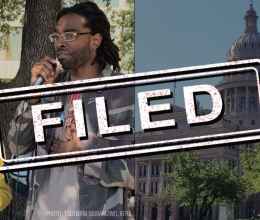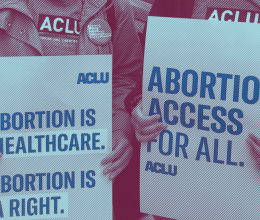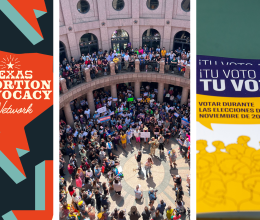
If the phrase “sanctuary city for the unborn” sounds like something out of a dystopian fiction novel, I have some bad news.
Mineral Wells, Texas, a small community near Fort Worth, just attempted to pass a local ordinance proclaiming itself such a city. The law they were considering would have criminalized abortion should Roe v. Wade be overturned by the Supreme Court.
The mayor of Mineral Wells was motivated by the template another rural Texas community created just weeks ago. Waskom, Texas’ all-male town council voted unanimously to outlaw abortion, with conditions for reproductive healthcare so severe that, if the Supreme Court overturns Roe v. Wade and the ordinance is enforced, a person won’t even be able to get emergency contraception at a local pharmacy or provide information to someone else about abortion care.
The Waskom case is the perfect reminder that abortion rights are not just a federal issue that depends on Roe v. Wade. Anti-abortion activists have attempted, successfully, to whittle away at the right to abortion at the state, county, and now the municipal levels.
In many ways, the Waskom ordinance is simply a grandstanding mechanism. Abortion is a fundamental right and still very much legal in Texas, and any law that attempts to interfere with that right is unconstitutional.
But the ordinance does have some serious, immediate implications: it makes it impossible for an abortion clinic to exist in Waskom, ever. By naming many well-known abortion providers like Planned Parenthood as “criminal organizations,” the ordinance effectively blacklists these medical providers from operating in the city for any purpose, using local policy to block them if one aimed to open in the area.
This point matters; due to various laws passed in the Texas Legislature over the years, people from smaller communities in Texas like Waskom already have very little access to reproductive healthcare. If more and more communities were to follow suit, this is yet another tactic for extremists to try and restrict access to abortion throughout the state.
Thankfully, in the case of Mineral Wells, the city council voted 5-2 against the ill-advised proposal. But that doesn’t mean there won’t be other municipal leaders that attempt to follow in Waskom’s footsteps and manage to pass this type of destructive local law.
The practice of using policy to chip away at access and antagonize those needing abortion care is a highly dangerous, even deadly reality. The future that many people have feared is now at our doorstep. A future where people’s basic rights to reproductive healthcare get drop-kicked back to the 1950s, when hundreds of thousands of people were seeking abortions, and thousands were hospitalized or died from botched unregulated abortions because there were no safe, legal alternatives.
People have sex and people get pregnant; attacks from extremists aiming to control our health care choices will never change that. But unless we push back and fight for these rights at all levels of government, we’ll find ourselves fighting just to survive.
Reproductive health care must be made an issue area priority, and we must demand that our elected officials protect people’s access to it, or elect those who will.
Learn more about how you can fight to protect reproductive health care, sign the pledge to defend abortion rights, and download your own abortion rights poster.





